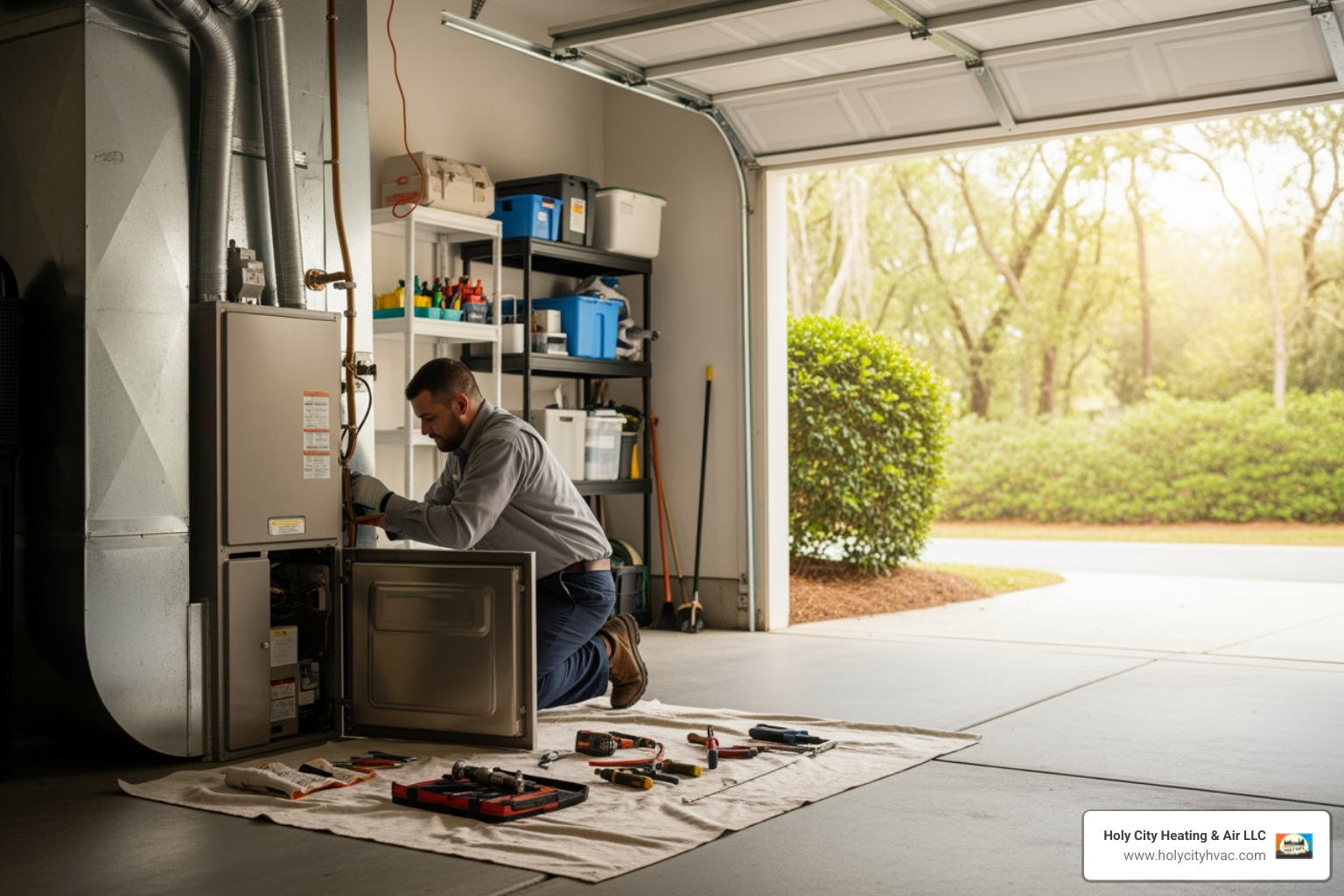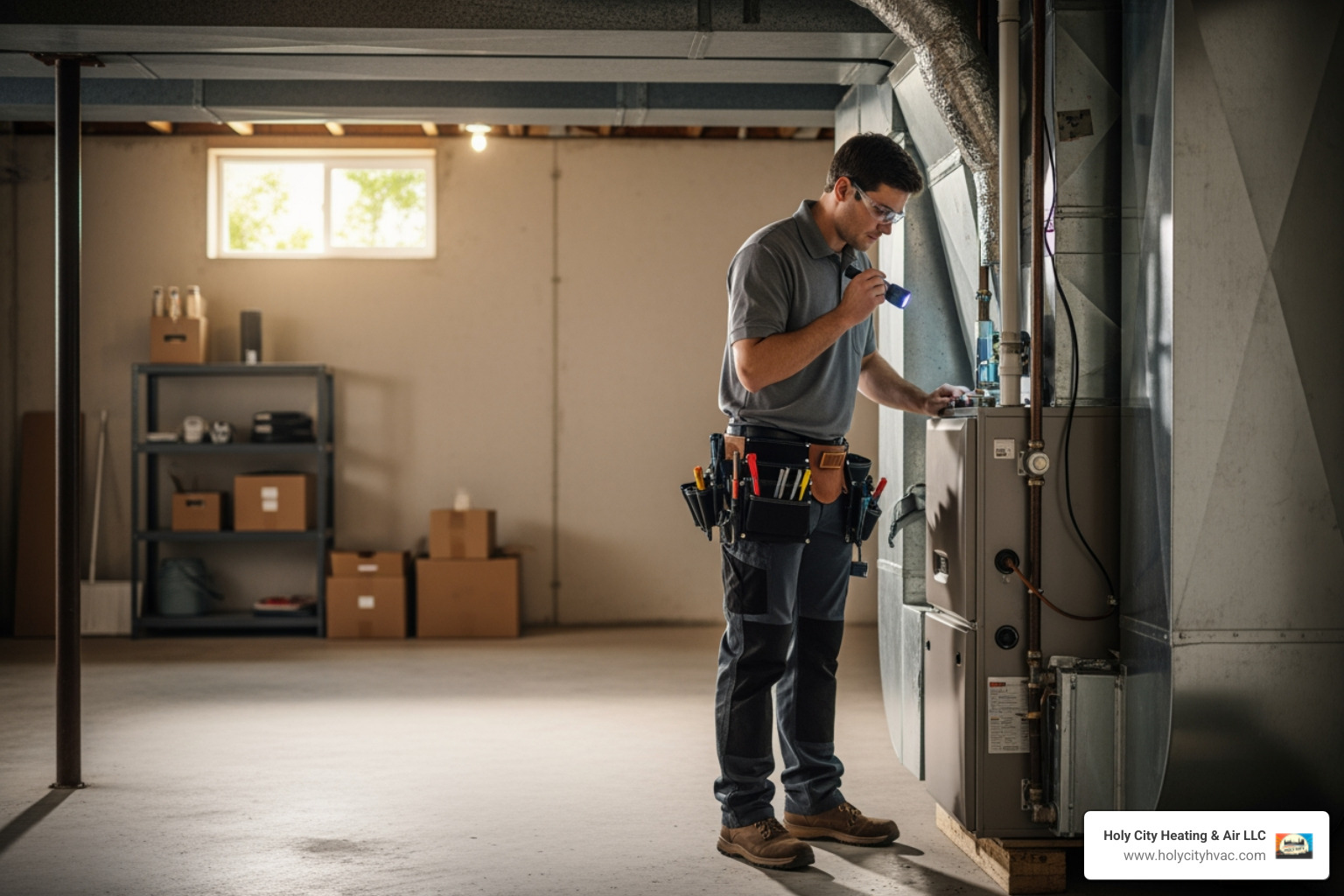
Why Replacing Water Heater Anode Rod Can Double Your Water Heater's Life
Replacing water heater anode rod is one of the most overlooked maintenance tasks that can save Charleston homeowners thousands of dollars. This simple DIY project takes just 1-2 hours and costs $20-$50, but it can extend your water heater's life from the typical 8-10 years to 15-20 years.
Quick Answer for Replacing Water Heater Anode Rod:
- Turn off power and water supply to the heater
- Drain 2-3 gallons from the tank
- Locate the hex head on top of the water heater
- Remove old rod with 1-1/16" socket wrench
- Install new rod with Teflon tape on threads
- Refill tank and restore power
- Replace every 3-5 years depending on water quality
The anode rod is your water heater's unsung hero - a sacrificial metal rod that attracts corrosive elements in your water. It literally sacrifices itself to protect your expensive steel tank from rust and corrosion.
Without regular anode rod replacement, Charleston's mineral-rich water can cause your water heater tank to rust out completely. The result? A flooded basement, emergency replacement costs of $800-$2000, and the headache of finding reliable service when you need it most.
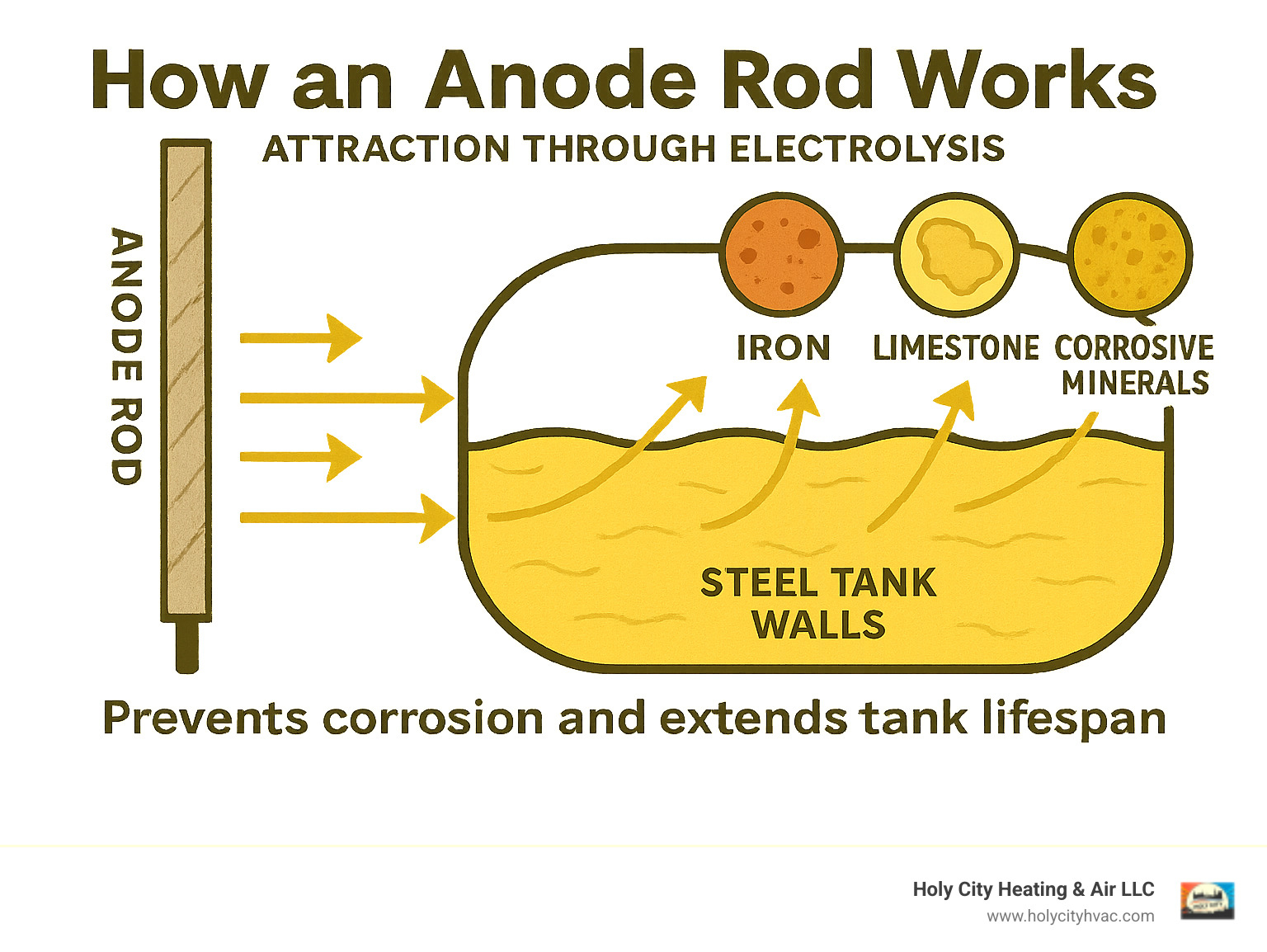
The Unsung Hero: Understanding Your Anode Rod
Your water heater's anode rod is a long, slender metal rod made from magnesium, aluminum, or an aluminum/zinc alloy. It sits inside your tank, acting as an unsung hero that literally sacrifices itself to protect your investment from Charleston's mineral-rich water.
The process is called galvanic corrosion. Your steel water heater tank naturally wants to rust in hot water. While a glass lining offers protection, tiny cracks inevitably form. The anode rod, made from a more reactive metal than steel, acts like a magnet for corrosive elements like iron and limestone. Through electrolysis, these elements attack the anode rod instead of your tank walls.
Once the anode rod is depleted, these corrosive elements attack your tank. This leads to rusty water, strange noises, and eventually a leak, requiring an emergency replacement. Regular anode rod replacement is the key to preventing this, extending your water heater's life from 8-10 years to 15-20 years. Sometimes water heater problems go beyond the anode rod. If you're curious about other issues, check out our guide on The Need for Water Heater Repairs.
Key Signs You Need a Water Heater Anode Rod Replacement
Your water heater will signal when its anode rod needs help. Knowing what to look and smell for can save you from a cold shower or a flooded utility room.
- Rotten Egg Smell: If your hot water smells like sulfur, it's a classic sign. The anode rod is reacting with sulfur bacteria in the water, creating hydrogen sulfide gas.
- Loud Popping or Rumbling Noises: While sediment buildup is a common cause of noise, it can also mean your tank is corroding because the anode rod is no longer effective.
- Rusty or Discolored Hot Water: If your hot water has a reddish tint while your cold water is clear, it's a sign of internal rust. This means the anode rod is depleted and the tank itself is being attacked.
- Clogged Faucet Aerators: A slimy, gel-like substance blocking your faucets is often sediment and byproducts from a deteriorating anode rod inside your tank.
- Higher Utility Bills: A worn-out anode rod leads to sediment buildup around the heating elements. This forces your water heater to work harder and use more energy to heat the same amount of water.
How Often Should You Replace an Anode Rod?
There's no single answer for how often to replace an anode rod, but the general guideline is every 3-5 years. However, several factors specific to your Charleston home can change this timeline.
- Water Quality: This is the biggest factor. Charleston's water varies by neighborhood. Hard water, with its high mineral content, forces the anode rod to work harder and depletes it faster. Conversely, soft water can be more conductive, accelerating the electrochemical reaction and wearing out the rod more quickly, especially magnesium rods.
- Water Softeners: If you use a water softener, your water may become more aggressive towards the anode rod. It's wise to inspect the rod more frequently, perhaps every 1-2 years.
- Water Usage: High hot water usage in a household means the anode rod will be consumed faster.
- Manufacturer Recommendations: Most manufacturers suggest inspecting the rod every 1-3 years and replacing it when it's over 50% consumed. Based on our experience with Charleston water heaters, checking every 2-4 years is a proactive approach to prevent problems.
Your Step-by-Step Guide to Replacing Water Heater Anode Rod
Replacing water heater anode rod is a manageable DIY task for most homeowners. Like any project involving plumbing and electricity or gas, the key is preparation and safety. Let's walk through the process correctly.
Tools and Materials You'll Need
Gathering your tools first prevents mid-project interruptions. Here's what you'll need:
- Socket Wrench with a 1-1/16-inch Deep Socket: This fits most anode rods, but check your manual to be sure. A deep socket is essential for a proper grip.
- Breaker Bar or Steel Pipe: The old rod will likely be very tight. A breaker bar provides the extra leverage needed to loosen it.
- Garden hose and Bucket: For partially draining the tank.
- New anode rod: Ensure it's the correct type for your heater.
- Teflon tape or pipe dope: To seal the new rod's threads. Pipe dope is often preferred for a better seal that doesn't impede conductivity.
- Other Supplies: Work gloves, rags, and towels. A spray lubricant or an impact wrench can be helpful for extremely stubborn rods.
The Replacement Process in 7 Steps
Now for the main event. Take your time with each step to avoid creating bigger problems.
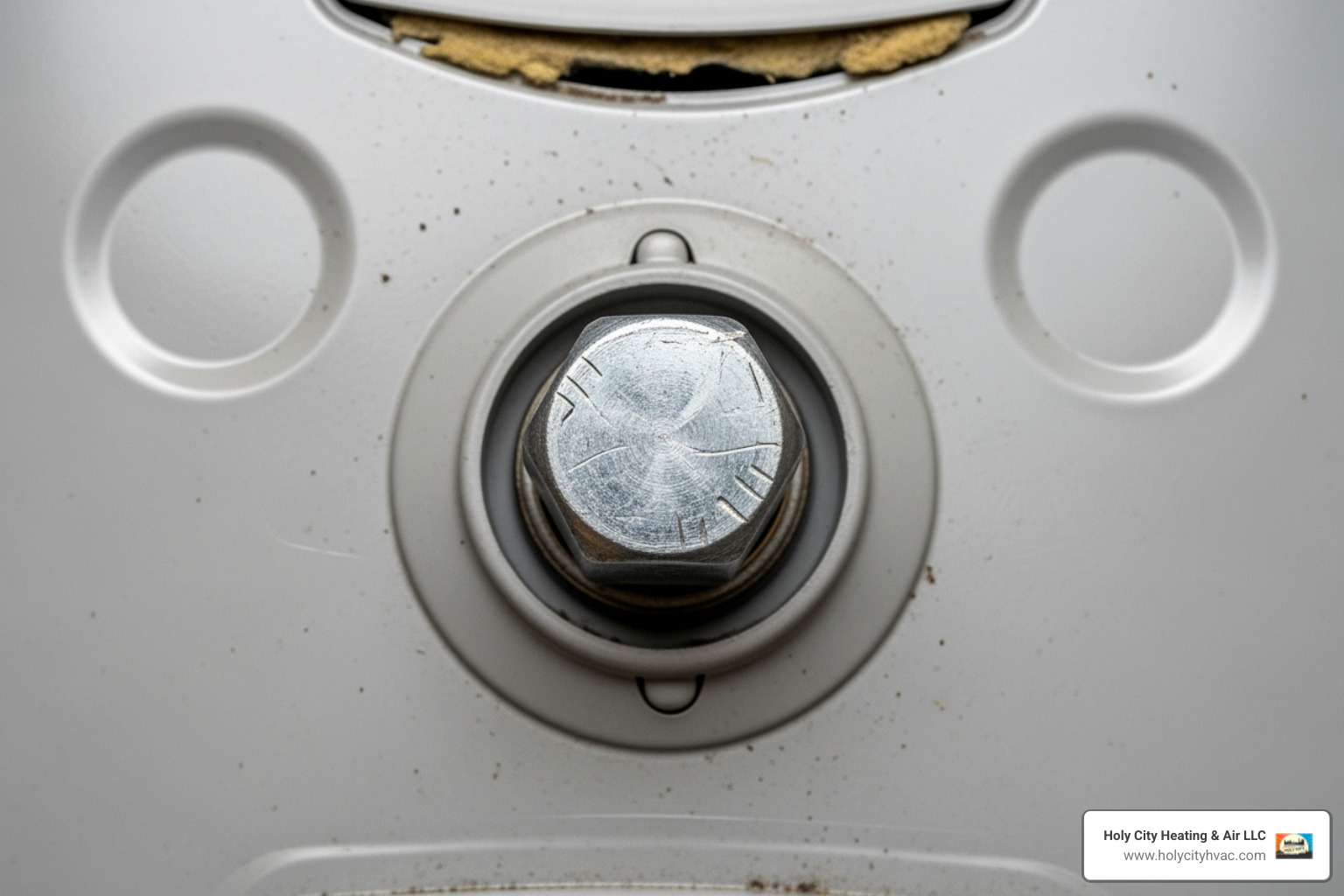
Step 1: Turn Off Power and Water Supply
Safety first. For an electric water heater, turn off its circuit breaker. For a gas unit, turn the control knob to "Off" and close the gas supply valve. Next, shut off the cold water supply valve to the heater. Open a nearby hot water faucet to relieve pressure in the tank.
Step 2: Drain the Tank Partially
Connect a garden hose to the drain valve at the bottom of the tank and let 2-3 gallons of water flow into a bucket or drain. This lowers the water level below the anode rod opening. Note: If you see significant rust flakes, the tank itself may be corroding, indicating a more serious problem.
Step 3: Locate the Anode Rod
The anode rod is on top of your water heater. Look for a hexagonal head (the 1-1/16-inch size) that may be under a plastic cap. On some models, it's combined with the hot water outlet pipe or located under the top metal cover. Check your manual if you can't find it.
Step 4: Remove the Old Rod
Place the socket on the hex head and turn counter-clockwise. The rod will be tight, so use your breaker bar for leverage. You may need significant force; ask a helper to steady the tank if it starts to twist. Once loose, unscrew the rod completely. It's normal to have to bend the old rod to remove it if you have low overhead clearance.
Step 5: Inspect the Old Rod
Compare the old rod to the new one. A spent rod will be thin, pitted, and heavily corroded, possibly down to the steel core wire. This indicates it was doing its job protecting the tank.
Step 6: Install the New Rod
Apply pipe dope or 3-5 wraps of Teflon tape to the threads of the new rod. Carefully thread it in by hand to prevent cross-threading. Use your wrench to tighten it until it's snug—about a half-turn past hand-tight is usually sufficient. Do not overtighten.
Step 7: Refill and Restart
Close the drain valve and open the cold water supply. Let the hot water faucet you opened earlier run until water flows steadily without any air sputtering. Check for leaks around the new anode rod. Once the tank is full and leak-free, restore power to your electric unit or relight the pilot on your gas unit.
Choosing the Right Rod & Troubleshooting
Choosing the right anode rod for your water chemistry is crucial for maximizing your water heater's life. Here's a breakdown of the main types:
- Magnesium anode rods are highly reactive and offer the best protection, making them ideal for softer water. They tend to be consumed faster, typically lasting 1-3 years.
- Aluminum/zinc anode rods are a great choice for harder water and are particularly effective at eliminating the "rotten egg" smell caused by sulfur bacteria. They generally last longer (3-5 years) but offer slightly less aggressive protection than magnesium.
- Powered anode rods are a high-tech, long-term solution. Instead of a sacrificial metal, they use a small electrical current to prevent corrosion. They last 10+ years, work in all water types, and eliminate odors, but have a higher upfront cost.
Understanding your water—hard, soft, or smelly—will help you pick the ideal match.
Troubleshooting Common Issues When Replacing Water Heater Anode Rod
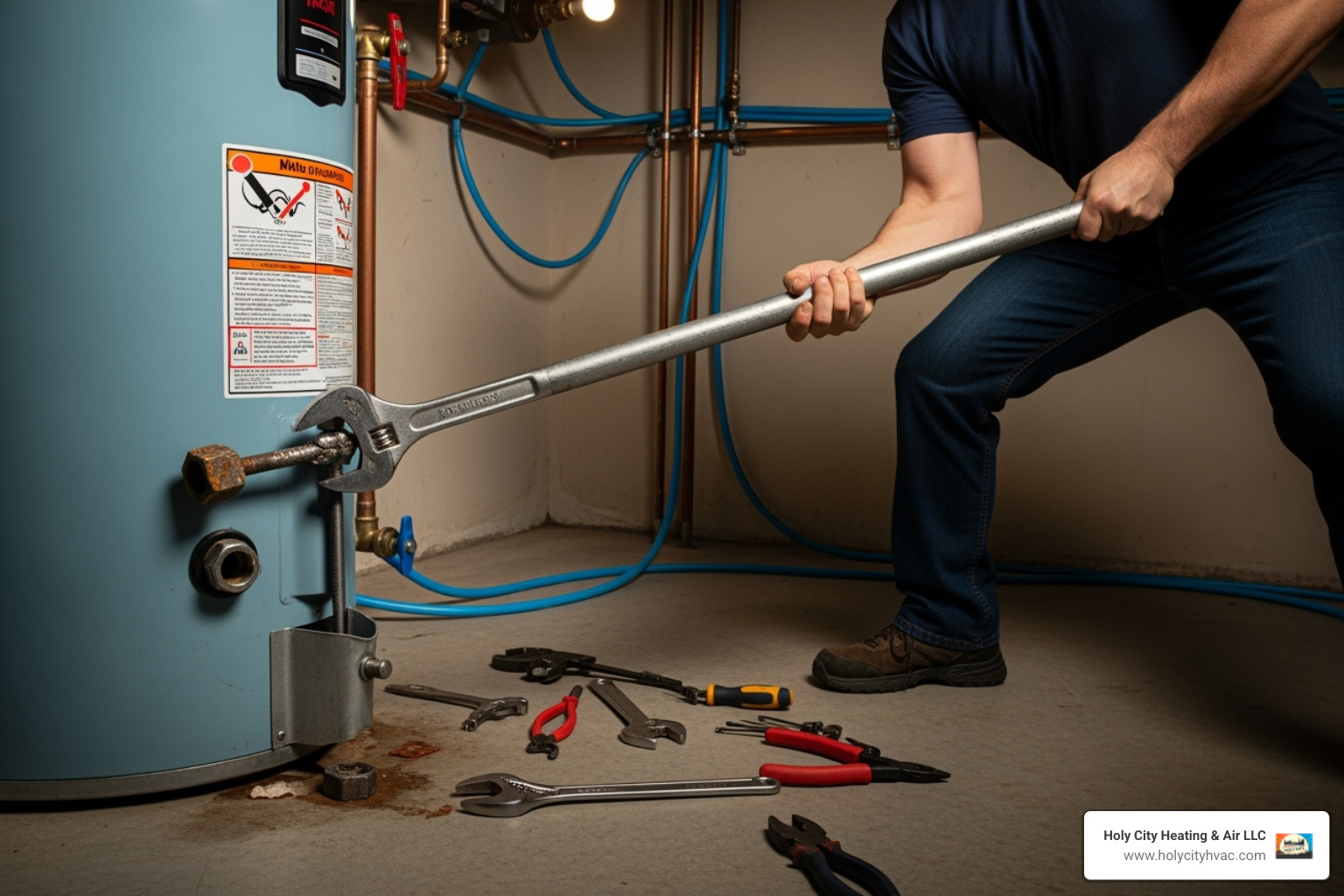
- Stuck Rod: This is the most common problem. Use a high-quality 1-1/16-inch socket and a long breaker bar for leverage. Apply steady, strong pressure. An electric impact wrench is also very effective at breaking loose stubborn rods.
- Stripped Hex Head: This happens when using the wrong size socket or applying force at an angle. To prevent it, ensure your socket is the correct size and fits snugly before applying force.
- Limited Overhead Space: If you don't have enough clearance to pull out a long, rigid rod, use a flexible anode rod. These are segmented and can be fed into the tank in tight spaces.
- Leaking During Removal: If water leaks from the opening as you loosen the rod, you haven't drained enough water. Close the valve, drain a bit more, and try again.
Sometimes, a rod just won't budge. If you've tried everything and are still stuck, there's no shame in calling for backup. Our team at Holy City Heating & Air has specialized tools and experience with the toughest jobs. For comprehensive Water Heater Repair Charleston SC, you can trust our licensed professionals to get it done safely.
Frequently Asked Questions about Anode Rods
Over the years, we've fielded countless questions about anode rods from homeowners throughout Charleston and the surrounding areas. These little-known but mighty components spark a lot of curiosity once people find their importance. Let's tackle the most common questions we hear.
Can replacing the anode rod void my water heater's warranty?
This question keeps many homeowners up at night, and honestly, it's a smart concern to have. The short answer is: it depends on your specific warranty terms and how the work is performed.
Most water heater manufacturers actually expect regular anode rod maintenance - it's often mentioned in their owner's manuals as routine upkeep. However, the devil is in the details. Many warranties include clauses that exclude coverage for damage caused by "improper installation" or "incorrect maintenance procedures."
Here's where it gets tricky: if you're replacing water heater anode rod yourself and something goes wrong - maybe you cross-thread the new rod, overtighten it and crack the tank, or cause a leak - that damage likely won't be covered under warranty.
Our recommendation? Always check your manufacturer's manual first. Look for specific language about DIY maintenance and anode rod replacement. When in doubt, having a licensed professional handle the job protects both your water heater and your warranty coverage.
The peace of mind that comes with professional installation often outweighs the cost savings of doing it yourself, especially if your water heater is still under warranty.
What is the average cost of replacing an anode rod?
Here's some good news: replacing water heater anode rod is one of the most cost-effective maintenance tasks you can perform on your home.
If you're tackling this as a DIY project, your main expense is the anode rod itself. Most quality replacement rods fall into a very reasonable price range. You might also need to invest in a few tools if you don't already have them - like a large socket wrench or breaker bar - but these are tools you'll use again and again for other home projects.
When you hire a professional service, you're naturally paying for expertise, proper tools, and labor. The total investment is still remarkably small when you consider what you're protecting. Think about it this way: you're making a modest investment to potentially double the life of an appliance that costs well over a thousand dollars to replace.
The math is pretty compelling. Even with professional installation, you're spending a fraction of what a new water heater would cost. And if that simple maintenance task extends your current unit's life by even a few years, the return on investment is enormous.
Do tankless water heaters have anode rods?
This is one of our favorite questions because it really highlights how different water heating systems work. The answer is no - tankless water heaters don't have anode rods, and they don't need them.
Here's why the design makes all the difference. Traditional tank-style water heaters store dozens of gallons of water in a steel tank, creating a perfect environment for corrosion. That stored water sits there, day after day, slowly working away at the tank walls. The anode rod jumps in as the hero, sacrificing itself to protect the tank.
Tankless water heaters work completely differently. They don't store water at all. Instead, they heat water on demand as it flows through a compact heat exchanger. Since there's no big tank of stored water, there's no need for corrosion protection from an anode rod.
That doesn't mean tankless units are maintenance-free, though. They need regular flushing to remove mineral deposits from their heat exchangers, especially here in Charleston where our water can be pretty mineral-rich. It's a different type of maintenance, but still important for keeping your system running efficiently.
If you're curious about making the switch to tankless or need service for an existing unit, we'd love to help you explore your options with Tankless Water Heaters Charleston SC.
Protect Your Investment with Proper Maintenance
As we've covered, replacing water heater anode rod is your secret weapon against costly, premature water heater failure. This simple maintenance task can be the difference between a water heater lasting 15-20 years versus one failing in just 8-10. For a small investment of time and money, you can essentially doubling your water heater's life, protecting your home from the headache of a sudden breakdown and providing incredible peace of mind.
But let's be honest - sometimes life gets busy, or you run into one of those stubborn anode rods that just won't budge. Maybe you're dealing with limited space in your utility room, or you'd simply prefer to have a professional handle the job. That's where we come in.
At Holy City Heating & Air, we've been helping Charleston families protect their home comfort investments since 2015. Our EPA-certified, licensed professionals have tackled countless anode rod replacements, from the straightforward ones to those tricky situations that require specialized tools and expertise.
As a family-owned company with over 20 years of industry experience, we understand that your home is your sanctuary. We combine the resources and reliability of a growing company with the personal touch you'd expect from your neighbors. When we invest in our team's training and equipment, it's so you receive the best possible service every time we visit your home.
Whether you're ready to tackle your first anode rod replacement or you need help with more complex water heater issues, we're rooted right here in your community and committed to your long-term comfort. For all your water heater needs - from routine maintenance to comprehensive repairs and new installations - contact us for all your water heater needs in Charleston, SC. Let us help you protect your investment and keep that hot water flowing reliably for years to come.
Recent posts







